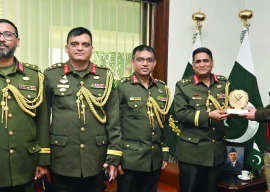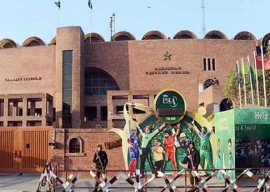
The vote came hours after UN ceasefire monitors visited the Syrian city of Homs on Saturday after months of bombardment.
Opposition activists in Homs, epicenter of the 13-month-old revolt against President Bashar al-Assad, said shelling and gunfire stopped for the first time in weeks before Syrian authorities let the monitors into the city.
The resolution said that deployment of the UN observer mission, which will be called UNSMIS, will be "subject to assessment by the Secretary-General (Ban Ki-moon) of relevant developments on the ground, including the cessation of violence."
The council's resolution also noted that the cessation of violence by the government and opposition is "clearly incomplete" and warned that the 15-nation body could consider "further steps" in the event of non-compliance with its terms.
Like the council's resolution from last week that authorized deployment of an advance team of up to 30 monitors, Saturday's resolution calls on both the Syria government and opposition to halt fighting that has killed thousands over the past year.
The council's move to condition deployment of UNSMIS on Ban's assessment of compliance with a truce reflected the fact that the US and European delegations are concerned about the failure of the Syrian government to halt the violence, return troops to barracks and withdraw heavy weapons.
Russia's UN Ambassador Vitaly Churkin welcomed the resolution's adoption.
"We now see the main aim as being the unswerving clear respect by all parties of the provisions of the resolution," he told the council. "Any deviation in terms of interpretation, or deviation from the provisions is unacceptable."
French Ambassador Gerard Araud said "we're taking a risk" with the deployment of UNSMIS, adding that the council would have to consider sanctions if the Syrian government continues the violence.
A handful of monitors has been in the country for a week as an advance party while diplomats hammered out the mandate for a force of hundreds. During that time, a ceasefire has so far failed to end violence in the worst-hit parts of the country.
Activists said the shelling let up only to make it look as if the government was abiding by the truce, mediated by international peace envoy Kofi Annan, and they expected shelling to resume as soon as the monitors left.
Rubble-Filled Streets
Amateur video footage posted on the internet showed the monitors, clad in turquoise bullet-proof vests, being escorted by hordes of opposition residents through rubble-filled streets.
"The people want the overthrow of the president," chanted the residents, many carrying the Syrian revolutionary flag.
"A team of observers have been sent to Homs and met the governor," UN spokesman Khaled al-Masri said. "They are now visiting districts of the city."
In another development, a "massive explosion" was heard near a military airport in the Syrian capital Damascus on Saturday, a resident said, adding that he was not sure what had caused the blast. No further details were immediately available.
Assad's opponents fear that a few hundred observers with a weak mandate would act as little more than a fig leaf for the government, thwarting more robust intervention to halt the bloody crackdown on cities that have risen up against Assad.
A similar-sized Arab League observer mission collapsed in failure in January after just a month. But Annan's staff have argued that a small observer force can still help improve the situation by changing the political conditions on the ground.
The wobbly ceasefire was further undermined on Friday when at least 42 people were killed - 15 of them by two roadside bombs targeting security forces and many of the others by government forces' shelling of Homs.
On Saturday, the Syrian state news agency said that an "armed terrorist" group had blown up an oil pipeline in the eastern province of Deir al-Zor, near the border with Iraq.
UN chief Ban urged the government and opposition to make the deployment of the military observers possible.
"(Ban) calls upon the Government of Syria and other parties swiftly to create the conditions necessary for the deployment of the mission," his press office said in a statement.
"He stresses the need for the Government of Syria to end all violence and human rights violations, and in particular to stop the use of heavy weapons and to withdraw such weapons and armed units from population centers," the statement said.
Eight monitors are already in Syria from Morocco, Brazil, Belgium, Switzerland and Norway after the council authorized an advance team of up to 30 on Saturday. A spokesman for that team told Reuters two more monitors were due to arrive on Monday.
'Syria needs this'
Asked if Syria needed more monitors, Turkish Prime Minister Tayyip Erdogan told reporters during a visit to Qatar on Saturday that the number should be increased. "It could be thousands, because Syria needs this," he said, according to NTV news channel.
The main opposition group, the Syrian National Council, has welcomed the observers' mission and said that more monitors must be deployed to serve as witnesses.
The observers' task is to oversee the ceasefire mediated by Annan, a former UN secretary-general. The plan calls for an end to fighting by government security forces and rebels, withdrawal of heavy weapons from towns, the return of the army to barracks, humanitarian access and dialogue between the government and opposition aimed at a "political transition."
Annan's deputy, former Palestinian foreign minister Nasser al-Kidwa, criticized both sides, but particularly government forces, for refusing to stop fighting completely.
"We don't see much of a ceasefire," he told France 24 television. "The situation of course is not good. There are many reasons to be worried by the lack of implementation, at least lack of full implementation by (the) Syrian government and perhaps some other parties as well."
Nine Syrian army defectors were killed on Saturday by government troops in Aleppo province, the Syrian Observatory for Human Rights said. The sound of gunfire and explosions were heard by residents in the town of Karak, in Deraa province, the birthplace of the revolution, the Observatory added.
COMMENTS (1)
Comments are moderated and generally will be posted if they are on-topic and not abusive.
For more information, please see our Comments FAQ







1724994274-0/BeFunky-(12)1724994274-0-270x192.webp)







1736844405-0/Express-Tribune-(2)1736844405-0-270x192.webp)







At last Russia wants to be on the right side of history after all its vetoes at the U.N. Security Council. Without its pressure Assad could still hang on indefinitely. Now he sees no option but to bend when Russia - along with China - insist something has to be done in Syria. No doubt Moscow - indirectly Vladmir Putin - wants to assume a role on the international stage as arbiter between the opposition and the regime, hoping to be able to keep the Port of Tartus on the Mediterranean in the post-Assad Syria.